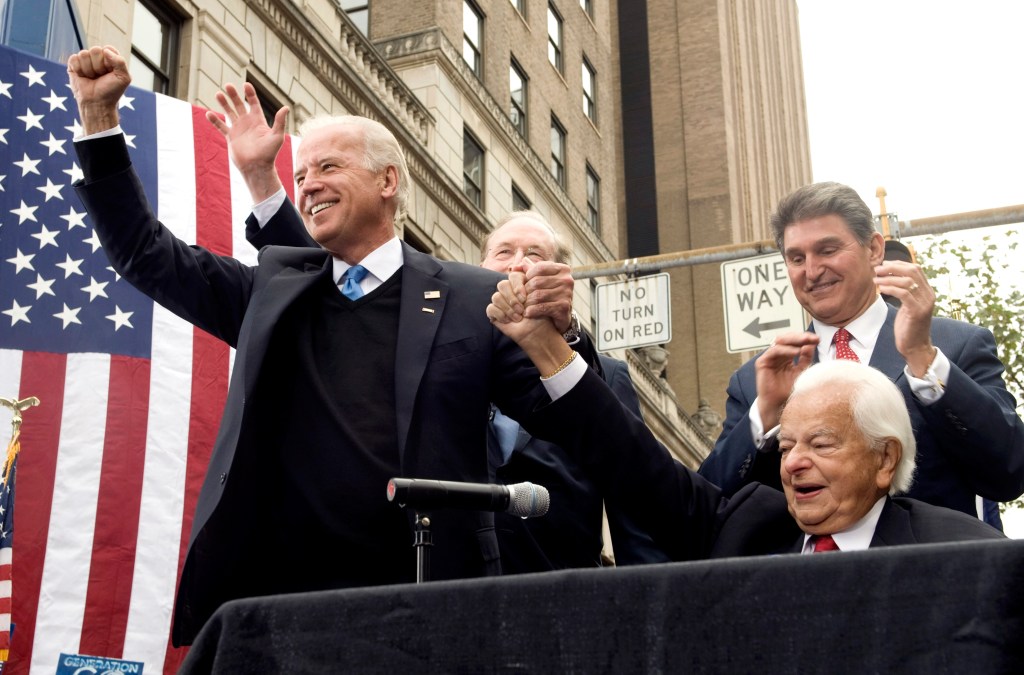Does a viral photo show Joe Biden standing next to the grand wizard of the Klu Klux Klan? An old image showing Biden with the late Sen. Robert Byrd of West Virginia is spreading again on social media.
“Here’s your Democrat party, folks! This is who they are!” one post reads. Attached is a photo of Biden standing next to Byrd. “Biden with Grand Wizard of KKK,” it says. “So who again is playing you, lying to you, using you for the votes, Creators of the KKK, opposed civil right of blacks. Yup thats the Democratic party”
The photo and attached caption appear to have first circulated in late 2019 during the early stages of Biden’s 2020 presidential campaign.
The photo of Biden and Byrd is real, and Byrd’s membership in the Klan has been well-documented, but the caption overstates Byrd’s level of involvement with the organization. Byrd was a member of the Klu Klux Klan in the early 1940s, but was not the organization’s grand wizard—a title granted to its national leader.
The original photo was taken on October 24, 2008, by Associated Press photographer Bob Bird. It depicts Biden alongside West Virginia’s then-Gov. Joe Manchin and West Virginia Sens. Byrd and Jay Rockefeller at a campaign rally in Charleston, West Virginia, during the lead-up to the 2008 presidential election.
Born in 1917, Byrd organized a 150-member chapter of the Klu Klux Klan in the early 1940s, which he led for several years. In his 2005 memoir, Byrd claimed that his chapter never partook in racial violence or demonstrations, but admitted that he reflected “the fears and prejudices I had heard throughout my boyhood.” In 1944, Byrd wrote in a letter that he “never in the world [would be] convinced that race mixing in any field is good.” He also declared that he “shall never submit to fight beneath [the flag] with a negro by my side,” and that he would rather “die a thousand times, and see this old glory trampled in the dirt never to rise again, than to see this beloved land of ours become degraded by race mongrels, a throwback to the blackest specimine from the wilds.”
By the time he ran for Congress in 1952, Byrd’s direct involvement with the Klan had ended, though it is unclear when exactly he left the organization. His former membership in the hate group, however, became an ongoing issue throughout his long political career. “It has emerged throughout my life to haunt and embarrass me and has taught me in a very graphic way what one major mistake can do to one’s life, career, and reputation,” Byrd wrote in his memoir. “My only explanation for the entire episode is that I was sorely afflicted with tunnel vision—a jejune and immature outlook—seeing only what I wanted to see because I thought the Klan could provide an outlet for my talents and ambitions.”
Byrd went on to become the longest-serving senator in the country’s history before his death in 2015, and served twice as Senate majority leader.
If you have a claim you would like to see us fact check, please send us an email at factcheck@thedispatch.com. If you would like to suggest a correction to this piece or any other Dispatch article, please email corrections@thedispatch.com.










Please note that we at The Dispatch hold ourselves, our work, and our commenters to a higher standard than other places on the internet. We welcome comments that foster genuine debate or discussion—including comments critical of us or our work—but responses that include ad hominem attacks on fellow Dispatch members or are intended to stoke fear and anger may be moderated.
With your membership, you only have the ability to comment on The Morning Dispatch articles. Consider upgrading to join the conversation everywhere.